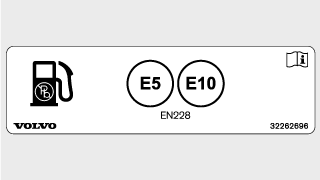Warning
Never swallow fuel. Fuels such as petrol, bioethanol and mixtures of these are very toxic and can cause permanent injury or even death if they are swallowed. Seek medical attention immediately if you have swallowed fuel.
Always take precautions to avoid inhaling fuel fumes and getting fuel splashed in your eyes.
If you get fuel in your eyes, remove contact lenses if applicable, rinse your eyes thoroughly with water for at least 15 minutes and seek medical attention.
Carbon monoxide is a toxic, colourless and odourless gas. It is present in all exhaust gases. If you ever notice the smell of exhaust inside the car, make sure the passenger compartment is ventilated and contact an authorised Volvo workshop for any required repairs or servicing.
Avoid any fires, such as from cigarette lighters and lit cigarettes.
When refuelling your car, always follow your local restrictions.
Important
Refuelling your car
Only use petrol from well-known manufacturers. Never refuel your car if you aren't sure about the fuel's quality.
Always use the correct fuel. Look at the label on the inside of the fuel filler flap. Even small amounts of the wrong type of fuel could damage the fuel system and engine.
Always follow the warning signs posted at the petrol station.
Close all doors and windows before you start refuelling.
Additives and quality
To avoid damage to the engine, only use unleaded petrol.
Do not use fuel containing methanol.
Except for the use of antifreeze for fuel lines during the winter, do not use solvents, thickeners or other additives in the car's fuel, cooling or lubrication systems. Overuse may damage your engine, and some of these additives contain organically volatile chemicals. Do not needlessly expose yourself to these chemicals.
Octane rating
There are different octane ratings of petrol that are adapted for different types of driving.
When driving in climates warmer than +38°C (100°F), the highest possible octane number is recommended for an adapted performance and fuel consumption.
- lower than RON 95 cannot be used.
Petrol identifiers

Petrol with the following identifiers may be used in cars with a petrol engine:


Important
Fuel with ethanol
Fuel containing up to 10% ethanol by volume is allowed.
You can use EN 228 E10 petrol.
In some markets, you can use E20 petrol.
You cannot use ethanol higher than E10.
Petrol particle filter
Cars that use petrol are equipped with a particle filter for more efficient emissions control. During normal driving, the particles in the exhaust gases are collected in the filter. In normal driving conditions, passive regeneration is used to oxidise the particles and burn them away. This empties the filter.
If you drive your car at low speeds or repeatedly try to start your car in low outside temperatures, active regeneration may be necessary. Regeneration of the particulate filter starts automatically and normally takes about 10-20 minutes. The fuel consumption may increase during regeneration.
The capacity of the emissions system is affected by how the car is driven. If you drive your car for short distances at low speed or in cold climates where the engine does not reach normal operating temperature, it can lead to problems that eventually can cause a malfunction and trigger a warning message. If you mostly drive your car in city traffic, it is important to regularly drive at higher speeds to allow the emissions system to regenerate.